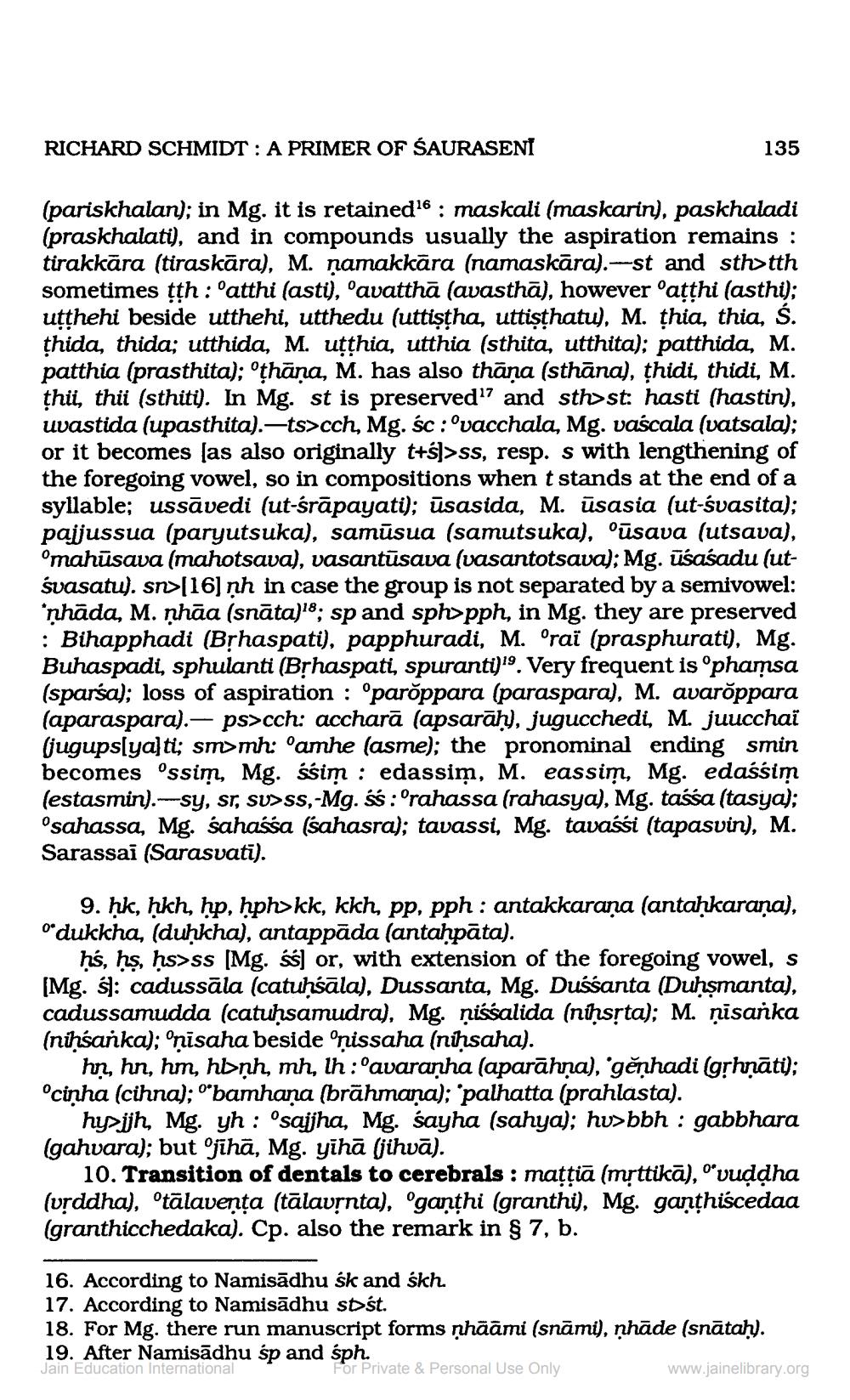________________
RICHARD SCHMIDT: A PRIMER OF SAURASENI
135
(pariskhalan); in Mg. it is retained16: maskali (maskarin), paskhaladi (praskhalati), and in compounds usually the aspiration remains : tirakkāra (tiraskāra), M. ṇamakkāra (namaskāra).—st and sth>tth sometimes tṭh: 'atthi (asti), °avatthā (avasthā), however 'aṭṭhi (asthi); utthehi beside utthehi, utthedu (uttiṣṭha, uttiṣṭhatu), M. thia, thia, Ś. thida, thida; utthida, M. uṭṭhia, utthia (sthita, utthita); patthida, M. patthia (prasthita); °ṭhāṇa, M. has also thāņa (sthāna), ṭhidi, thidi, M. thii, thii (sthiti). In Mg. st is preserved" and sth>st: hasti (hastin), uvastida (upasthita).-ts>cch, Mg. śc: vacchala, Mg. vascala (vatsala); or it becomes [as also originally t+ś]>ss, resp. s with lengthening of the foregoing vowel, so in compositions when t stands at the end of a syllable; ussavedi (ut-śrāpayati); ūsasida, M. ūsasia (ut-śvasita); pajjussua (paryutsuka), samūsua (samutsuka), usava (utsava), 'mahūsava (mahotsava), vasantūsava (vasantotsava); Mg. ūsasadu (utsvasatu). sn>[16] nh in case the group is not separated by a semivowel: nhada, M. nhaa (snāta)18; sp and sph>pph, in Mg. they are preserved : Bihapphadi (Bṛhaspati), papphuradi, M. °raï (prasphurati), Mg. Buhaspadi, sphulanti (Bṛhaspati, spuranti)1o. Very frequent is 'phamsa (sparsa); loss of aspiration: 'parõppara (paraspara), M. avarŏppara (aparaspara).- ps>cch: accharā (apsarāḥ), jugucchedi, M. juucchaï (jugups[yati; sm>mh: 'amhe (asme); the pronominal ending smin becomes 'ssim, Mg. śśim: edassim, M. eassim, Mg. edaśśim (estasmin).-sy, sr, sv>ss,-Mg. ss: orahassa (rahasya), Mg. tassa (tasya); 'sahassa, Mg. sahassa (sahasra); tavassi, Mg. tavassi (tapasvin), M. Sarassai (Sarasvati).
9. hk, hkh, hp, hph>kk, kkh, pp, pph: antakkaraṇa (antaḥkaraṇa), "dukkha, (duḥkha), antappada (antaḥpāta).
hs, hs, hs>ss [Mg. s] or, with extension of the foregoing vowel, s [Mg. s]: cadussāla (catuḥśāla), Dussanta, Mg. Dussanta (Duḥṣmanta), cadussamudda (catuḥsamudra), Mg. nissalida (niḥsṛta); M. ṇīsanka (nihsanka); nisaha beside 'nissaha (niḥsaha).
hn, hn, hm, hbnh, mh, lh: 'avaraṇha (aparāhna), 'genhadi (gṛhṇāti); cinha (cihna); "bamhaṇa (brāhmaṇa); 'palhatta (prahlasta).
hy jjh, Mg. yh: sajjha, Mg. sayha (sahya); hv>bbh : gabbhara (gahvara); but jihā, Mg. yihā (jihvā).
10. Transition of dentals to cerebrals: maṭṭiā (mṛttikā), °*vuḍḍha (vṛddha), °tālaveṇṭa (tālavṛnta), 'ganthi (granthi), Mg. ganthiscedaa (granthicchedaka). Cp. also the remark in § 7, b.
16. According to Namisādhu śk and skh.
17. According to Namisādhu st>st.
18. For Mg. there run manuscript forms nhāāmi (snāmi), nhāde (snātaḥ).
19. After Namisādhu śp and sph.
Jain Education International
www.jainelibrary.org
For Private & Personal Use Only




